
The Municipal Workers Rally in Lille
by Ranger Kidwell-Ross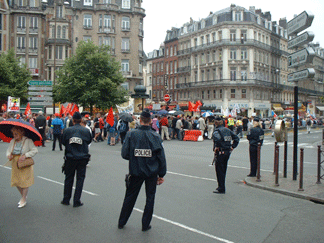
As I write this, I'm on the train to Lille, France's 4th largest city. Although a number (but not all) of the trains were running, the long lines at the ticket windows and information counter were filled with dozens of frustrated humans -- another result of the slowdown. Because the train I wanted to catch would arrive within the hour, the automatic Visa machines wouldn't sell me a ticket, either. I decided to just get on the train and plead ignorance, which, in this case, is pretty much the truth. What I didn't realize was that the journey was just beginning to become complicated.
The Paris-to-Lille train travels at upward of 300 kph. This reduces, by half, the time it takes to travel the same distance by car. When the railroad paralleled the freeway, it was fun to be speeding past even the fastest automobiles. Raphael picked me up at the same station that the strikers' rally would, theoretically, begin organizing at about 10 in the morning. He took me for a quick tourism spin around the darkening streets of Lille before heading to his office so I could send off some story files. Then, at the house he shares with Veronique and 4-year-old son, Sacha, we talked old times as long as we could keep our eyes open.
Next morning, Raphael swung us by his favorite bakery to pick up some of the wonderful croissants that France has made so popular around the world. Then, we went back to his office so I could back up all the photos I'd taken so far on the trip. Now, if my computer is lost or stolen, at least all the pictures I've taken so far will be safe. There was just enough time for Raphael to drive me to the rally at the train station, and still be on time for his first appointment of the day.
As we neared the station, parking became non-existent, and we encountered several rows of police officers blocking the street. I hadn't really known what to expect, but was definitely surprised by the magnitude of the demonstration the French municipal workers had organized.
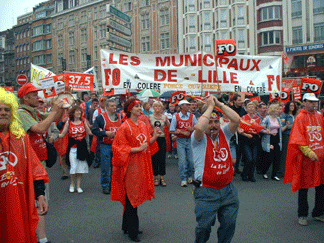
I'd estimate there were well over a thousand demonstrators -- perhaps more than twice that many. As municipal employees, they apparently had access to an impressive supply of flares. These were so numerous that the smoke was all-but-blinding much of the time. Most of the groups sang, with gusto, what sounded like Sousa-written union songs, punctuated by the beating of several types of 'drums.' Empty plastic barrels and 5-gallon metal tins seemed to be the instruments of choice, with a smattering of horns and even a few, real drums.
Although I couldn't decipher the meaning of many of the banners they carried, it was clear that the marchers were grouped according to the government agency they represented. Although several agency-type vehicles were in the parade, I never saw any sweepers.
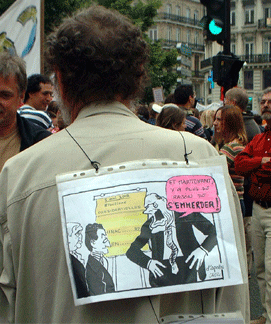
The level of organization was definitely impressive. Many of the groups were armed with printed handouts, and it sounded as though they'd been rehearsing their songs. Many people have told me that the French frequently go on strike; perhaps that's so they won't forget their union fight-songs.
To the best of my understanding, the short-version reasons for the strike are that the current Chirac government is mandating a change in retirement requirements. Until now, government workers could retire after 42 years on the job, and their retirement pay was based on their highest 15 years of earnings. The government has proposed a change to requiring 45 years of service, minimum, and a retirement income based on the highest 20 years of earnings. I think.
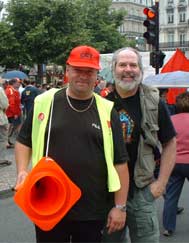
After the parade, I hung around for several hours to see if a sweeper would come along to clean up what was now a very littered street. Even though it meant delaying our departure from Paris, I was glad to make the sacrifice for you, our loyal sweeping-community readers. Besides, I didn't have a choice. When I went inside the station to catch my train back to Paris, I was greeted with the dreaded 'Retard Indetermine' sign. My noon ride back to Paris had been cancelled by the strike.
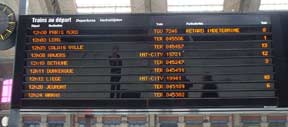
A little over three hours later, the train started running again, but from another train station several blocks away. When I finally got back to the hotel, it was late afternoon. As a result of rush hour traffic, which was more congested than normal due to the lack of train reliability, it took an incredible three hours in the car until we saw a sign indicating that Paris was now behind us. I must say that when I finally saw this particular city receding in my rearview, I breathed a heartfelt sigh of relief.
Perhaps I'll return someday and write the true story of how Paris is swept. For this trip, though, our next stop is one of the classic cities of France's famous wine country, Bordeaux. And, even though sweepers are not operating there at the moment, either, I promise we'll at least have an actual sweeper story for you. And, on the way there, you can take a look at what is offered throughout the French countryside in the way of a recycling program.
If you'd like, you may view a brief Quicktime movie taken in conjunction with this story, click here. Note you need to have either Quicktime or another plug-in viewer that will read a .mov file. The movie is advised for only high-speed connections, however, with a filesize of just over 10 megabytes.
 |
 |
Back to Table of Contents for Sweeping in Europe
© 2005 - 2021 World Sweeper |